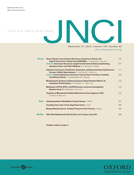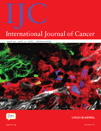
CANCER CAUSES & CONTROL
Scope & Guideline
Illuminating the Pathways of Cancer Causation and Control
Introduction
Aims and Scopes
- Epidemiological Studies:
The journal publishes research that investigates cancer incidence, prevalence, risk factors, and survival outcomes across diverse populations, utilizing both quantitative and qualitative methodologies. - Health Disparities and Equity:
A core focus is on understanding and addressing disparities in cancer outcomes based on race, ethnicity, socioeconomic status, and geographic location, aiming to promote health equity. - Community Engagement and Participatory Research:
The journal emphasizes the importance of community involvement in cancer research, promoting studies that engage local populations in identifying their cancer-related needs and priorities. - Intervention Studies:
Research on effective interventions for cancer screening, prevention, and treatment adherence is a significant aspect, including studies that assess the impact of public health initiatives. - Behavioral and Lifestyle Factors:
Investigations into the role of lifestyle factors, such as diet, physical activity, and psychosocial aspects, in cancer risk and survivorship are frequently featured. - Biomarkers and Genetic Studies:
The journal includes research on the genetic and biological underpinnings of cancer, exploring correlations between genetic markers and cancer risk or treatment outcomes.
Trending and Emerging
- Social Determinants of Health:
There is a significant increase in studies examining how social, economic, and environmental factors contribute to cancer disparities, emphasizing the need for comprehensive approaches to cancer control. - Community-Based Participatory Research (CBPR):
The journal is witnessing a rise in publications employing CBPR methodologies, which actively involve community members in the research process to ensure that findings are relevant and actionable. - Mental Health and Cancer:
Emerging research focuses on the intersection of mental health and cancer outcomes, exploring how psychological factors influence cancer progression and survivorship. - Innovative Screening Interventions:
There is a growing trend towards evaluating new screening methods and outreach strategies that improve accessibility and uptake, particularly in underserved populations. - Intersectionality in Cancer Research:
Increasingly, studies are considering the intersection of multiple identities (e.g., race, gender, sexuality) and their impact on cancer experiences and outcomes, leading to a richer understanding of health disparities. - Nutrition and Cancer Prevention:
Research exploring the role of dietary patterns and nutrition-related interventions in cancer prevention and survivorship is gaining momentum, reflecting a holistic approach to cancer control.
Declining or Waning
- Traditional Cancer Risk Factors:
Research focusing exclusively on traditional risk factors (such as smoking and alcohol consumption) has seen a decline, as the field increasingly emphasizes complex interactions involving social determinants and lifestyle. - Single-Disease Focus:
There is a waning emphasis on studies targeting individual cancer types in isolation, with a shift towards broader investigations that consider multiple cancer types and their interconnections. - Basic Laboratory Research:
While important, the volume of basic science studies that do not directly connect to epidemiological or community-focused applications appears to be decreasing within the journal. - Outdated Screening Methods:
Research centered on older screening techniques without a contemporary context or evaluation of novel methods is less frequently published, as the field moves towards innovative screening approaches. - General Public Awareness Campaigns:
Public health campaigns that do not integrate community feedback or local context are increasingly less featured, as there is a growing recognition of the need for tailored, community-driven approaches.
Similar Journals

BULLETIN DU CANCER
Connecting research and practice to improve patient outcomes.BULLETIN DU CANCER is a pivotal academic journal dedicated to the field of oncology, providing a platform for innovative research and insights into cancer treatment and diagnostics. Published by Elsevier Masson, Corp Off in France, this journal has been a part of the scientific community since 1966, and is committed to sharing critical findings that influence clinical practices and improve patient outcomes. Despite its recent rankings placing it in the Q4 category for Cancer Research and Q3 for Hematology and other related fields, BULLETIN DU CANCER remains essential for those interested in the latest developments in cancer biology and treatment methodologies. With an emphasis on both basic and clinical research, it serves as a valuable resource for researchers, healthcare professionals, and students seeking to deepen their understanding in various dimensions of oncology. This journal is particularly relevant as it continues to spotlight emerging research trends and supports the global imperative to combat cancer more effectively.

BRITISH JOURNAL OF CANCER
Shaping the Future of Oncology Through Quality Scholarship.The British Journal of Cancer, published by SpringerNature, stands as a preeminent resource in the fields of Cancer Research and Oncology, with a distinguished history of publication dating back to 1947. With its Q1 rank in both categories for 2023, this journal is among the top-tier publications, offering cutting-edge research and insights into the biology, etiology, and treatment of cancer. The journal’s rigorous peer-review process ensures that readers are presented with high-quality studies that contribute to the advancement of cancer knowledge and clinical practice. Operating from the United Kingdom, it has garnered a notable impact factor and ranks impressively within Scopus, making it an essential publication for researchers, healthcare professionals, and students who are dedicated to understanding cancer's complexities. Access to the journal's articles is available in traditional formats, providing a versatile platform for disseminating pivotal research. As we move towards a future where cancer treatment and prevention remain crucial, the British Journal of Cancer continues to play a vital role in shaping the dialogue and discoveries within the oncology community.

JOURNAL OF CANCER EDUCATION
Empowering Knowledge, Transforming Cancer CareThe JOURNAL OF CANCER EDUCATION, published by SPRINGER, stands as a pivotal resource in the fields of oncology and public health. With an ISSN of 0885-8195 and an E-ISSN of 1543-0154, this esteemed journal has been disseminating vital research since 1986 and continues to play a crucial role in advancing knowledge until 2024. Recognized in 2023 with a Q3 rating in Oncology and a Q2 rating in Public Health, it reflects a solid standing in an ever-evolving academic landscape. The journal ranks #297 out of 665 in the Public Health category and #233 out of 404 in Oncology, showcasing its contribution to the scientific community. Aimed at researchers, practitioners, and students alike, the journal invites submissions that enhance understanding of cancer education, prevention, and management, ensuring that the knowledge shared is both impactful and accessible. With its focus on evidence-based practices and innovative educational strategies in cancer care, the JOURNAL OF CANCER EDUCATION serves as an essential platform for fostering collaboration and progress in oncology education.

CANCER
Pioneering insights that shape the future of oncology.CANCER, published by Wiley, stands as a pivotal journal in the field of oncology and cancer research, boasting an impressive impact factor and consistently dynamic growth since its inception in 1948. With an ISSN of 0008-543X and an E-ISSN of 1097-0142, this esteemed journal is recognized for its rigorous peer-reviewed articles, making significant contributions to the understanding of cancer biology, treatment modalities, and clinical practices. CANCER holds a distinguished position in the academic community, securing its placement in the Q1 category for both cancer research and oncology, and ranks within the top percentiles on Scopus, indicating its high impact and relevance. The journal is particularly beneficial for researchers, professionals, and students seeking to stay abreast of the latest advancements in cancer science. By addressing essential research questions and providing pathways for new therapies, CANCER continues to play a crucial role in shaping the future of oncology and improving patient outcomes.

Infectious Agents and Cancer
Transforming cancer research with groundbreaking studies on infectious agents.Infectious Agents and Cancer is a pivotal open access journal published by BMC, dedicated to advancing research at the intersection of infectious diseases and oncology. Since its inception in 2006, this journal has provided a platform for the exploration of the complex relationships between infectious agents and cancer development, aimed at researchers, healthcare professionals, and students alike. With a broad scope encompassing epidemiology and cancer research, the journal holds an impressive ranking in the Q3 quadrant for epidemiology, infectious diseases, and oncology in 2023, while also featuring in the Q4 category for cancer research. This distinguished journal not only contributes to the enrichment of scientific knowledge but also fosters collaborative efforts towards innovative solutions in the fight against cancer. Being part of the UK publishing landscape, the journal is accessible to a global audience, ensuring that vital research findings are disseminated widely to inform policy and practice in health sciences.

Middle East Journal of Cancer
Advancing cancer research for a healthier tomorrow.Middle East Journal of Cancer, with an ISSN of 2008-6709 and an E-ISSN of 2008-6687, is a prominent open-access journal published by Shiraz University of Medical Sciences since 2010. Based in Iran, the journal aims to advance the knowledge and understanding of cancer research and oncology through the dissemination of high-quality, peer-reviewed articles. With open access availability, it promotes global collaboration and accessibility in research, making findings readily available to a wider audience. The journal is categorized in Q4 for both Cancer Research and Oncology as of 2023, highlighting its emerging presence in these fields. Alongside its Scopus ranks, where it positions 319th out of 404 in Medicine - Oncology and 198th out of 230 in Biochemistry, Genetics and Molecular Biology - Cancer Research, it serves as a platform for researchers, professionals, and students to enrich their expertise and contribute to the evolving landscape of cancer studies. The journal's continuous commitment to quality and accessibility represents an essential resource for those dedicated to advancing cancer research and improving patient outcomes in the Middle East and beyond.

Journal of Cancer Prevention
Transforming Knowledge into Action Against Cancer.Journal of Cancer Prevention is a pivotal scholarly publication dedicated to advancing research and knowledge in the field of cancer prevention and control. Published by the Korean Society for Cancer Prevention, this journal serves as a platform for innovative studies that focus on strategies to mitigate cancer risk factors, enhance early detection, and improve public health policies. With an ISSN of 2288-3649 and E-ISSN of 2288-3657, the journal ensures wide accessibility to emerging evidential research, contributing significantly to the global discourse on cancer prevention. Though currently not an open-access journal, Journal of Cancer Prevention remains committed to disseminating high-quality research, emphasizing rigorous peer review processes and upholding scientific integrity. Researchers, healthcare professionals, and students alike are encouraged to engage with the journal’s contributions that aim to forge collaborative pathways towards effective cancer prevention strategies in diverse populations.

JNCI-Journal of the National Cancer Institute
Leading the charge in cancer innovation and discovery.JNCI-Journal of the National Cancer Institute, published by Oxford University Press Inc. in the United Kingdom, is a premier journal dedicated to advancing the field of cancer research and oncology. With a distinguished history dating back to 1940, this journal has consistently maintained a strong reputation within the academic community, achieving a remarkable Q1 ranking in both Cancer Research and Oncology as of 2023. Researchers and practitioners rely on the JNCI for original research articles, review papers, and cutting-edge findings that impact clinical practices and therapeutic strategies. Although it does not currently offer open access, the journal remains a vital resource for academicians and healthcare professionals seeking to enhance their understanding of cancer mechanisms and treatment innovations. Its rigorous peer-review process ensures the publication of high-quality, credible research that meets the evolving challenges of cancer treatment and prevention through to 2024.

INTERNATIONAL JOURNAL OF CANCER
Empowering discoveries in oncology and cancer biology.INTERNATIONAL JOURNAL OF CANCER, published by Wiley, stands as a premier platform for the dissemination of cutting-edge research in the fields of cancer research and oncology. With an impressive impact factor reflecting its rigorous peer-review process and significant contribution to the scientific community, this journal is categorized in Q1 for both Cancer Research and Oncology as of 2023. It boasts notable rankings, being placed 38th among 404 journals in Medicine - Oncology and 32nd among 230 in Biochemistry, Genetics, and Molecular Biology - Cancer Research, positioning it within the 90th and 86th percentiles, respectively. Since its inception in 1966 and continuing to 2024, the journal has played a pivotal role in advancing our understanding of cancer biology, treatment modalities, and innovative therapeutic approaches. While it operates under a subscription model, the journal is committed to making valuable research accessible to a broader scientific audience. Researchers, professionals, and students alike will find the INTERNATIONAL JOURNAL OF CANCER an essential resource for staying abreast of the latest advancements in cancer science.

Journal of the Egyptian National Cancer Institute
Advancing cancer research, one article at a time.Journal of the Egyptian National Cancer Institute, published by SPRINGER, serves as a vital platform for disseminating innovative research in the field of oncology and cancer research. With both ISSN 1110-0362 and E-ISSN 2589-0409, this Open Access journal has been committed to making significant contributions to the scientific community since its inception in 2005. Operating from its base in Egypt, it has established itself as an important resource for researchers, practitioners, and students alike, offering insights into contemporary issues and advancements in cancer care. Recognized in the 2023 category quartiles as Q3 in Cancer Research and Q3 in Oncology, the journal is positioned to impact the ongoing discourse in cancer treatment strategies and health policy. As it continues to publish peer-reviewed articles through available Open Access avenues, the Journal of the Egyptian National Cancer Institute remains dedicated to enhancing the knowledge base and collaborative efforts within the global cancer research community.